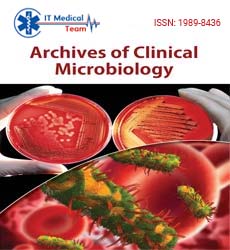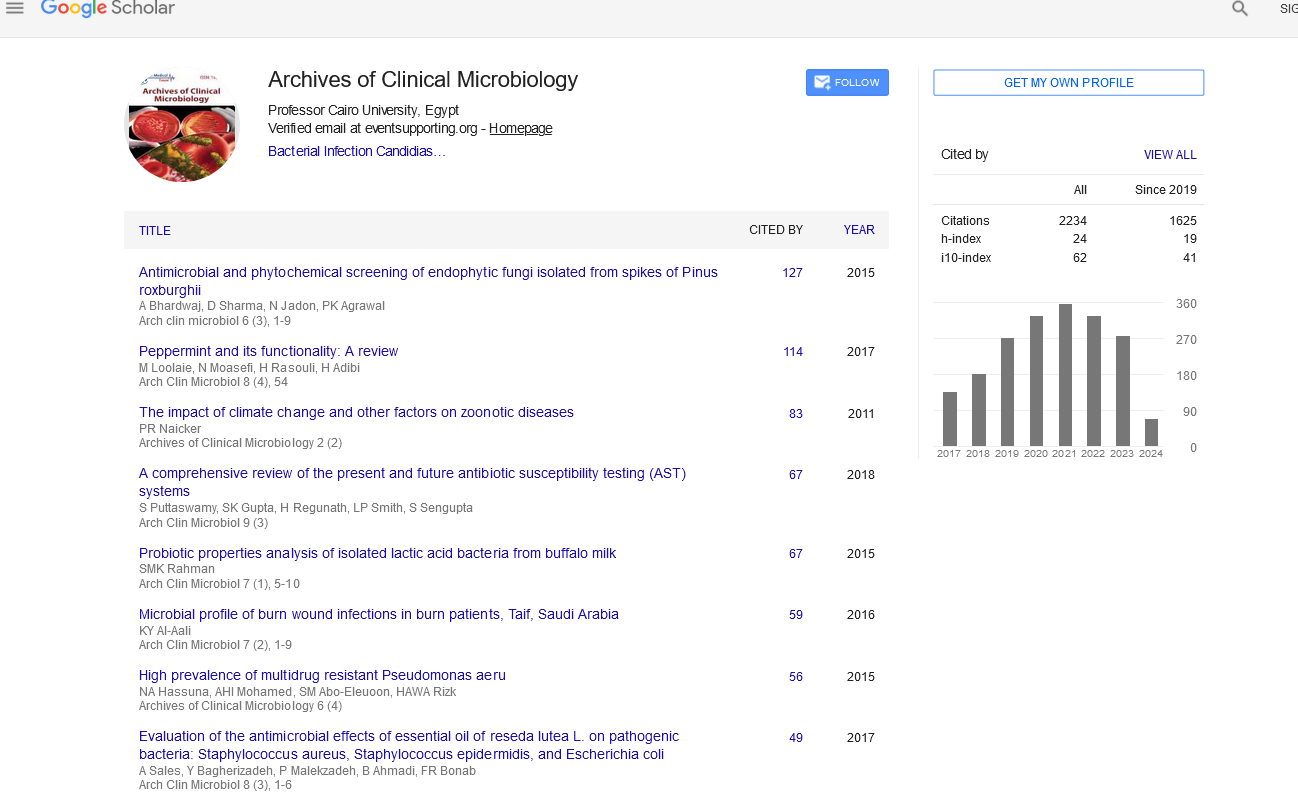Commentary - (2023) Volume 14, Issue 6
Unveiling the Genomic Mysteries of Microbes: A Journey into Microbial Genomics
Simona Venturoli*
Department of Microbiology, Sapienza University Rome, Rome, Italy
*Correspondence:
Simona Venturoli, Department of Microbiology, Sapienza University Rome, Rome,
Italy,
Email:
Received: 07-Nov-2023, Manuscript No. ipacm-23-14275;
Editor assigned: 09-Nov-2023, Pre QC No. ipacm-23-14275 (PQ);
Reviewed: 23-Nov-2023, QC No. ipacm-23-14275;
Revised: 30-Nov-2023, Manuscript No. ipacm-23-14275 (R);
Published:
07-Dec-2023
Introduction
In the vast world of microbiology, the study of microbial
genomics stands as a fascinating and rapidly evolving field.
Microbes, the tiny organisms that are often invisible to the
naked eye, play a crucial role in our ecosystem and human
health. They come in a variety of shapes, sizes, and functions
and their genomes hold the keys to understanding their
remarkable diversity and adaptability. This article explores
the captivating realm of microbial genomics, shedding
light on the secrets hidden within the genomes of these
minuscule powerhouses.
Description
The microbial universe
Microbial genomics encompasses the study of the genomes
of microorganisms, which include bacteria, archaea, viruses
and some microscopic eukaryotes. These microorganisms
are found everywhere, from the deep oceans to the soil
beneath our feet and even within our own bodies. They are a
significant and often overlooked part of earth's biodiversity.
Studying their genomes allows us to understand how they
thrive, adapt and interact with their environment.
Genomic diversity
One of the most striking aspects of microbial genomics is
the sheer diversity it reveals. Microbes have extraordinarily
dynamic genomes, ranging from a few thousand base
pairs to several million. Bacteria, for example, can possess
plasmids, small DNA molecules separate from the
chromosomal DNA, which may carry genes for antibiotic
resistance or other advantageous traits. This genetic
diversity enables microbes to adapt rapidly to changing
environmental conditions.
The human micro biome
The human micro biome, a diverse collection of
microorganisms living within and on the human body,
has been a subject of intense interest in recent years. These
microbial communities play a pivotal role in human
health, influencing digestion, immunity and even mood.
The study of the human micro biome through microbial
genomics has led to ground breaking discoveries, including
the identification of specific microorganisms associated
with various diseases and conditions.
For example, the gut micro biome, which consists of
trillions of microbes, plays a crucial role in our overall
well-being. Research in microbial genomics has revealed
the links between the gut micro biome and conditions
such as obesity, diabetes and inflammatory bowel diseases.
By examining the genomes of these microbes, scientists
can better understand the mechanisms underlying these
connections and develop targeted therapies.
Environmental microbial genomics
Microbes are essential contributors to ecosystems, where
they participate in nutrient cycling, carbon sequestration
and the degradation of organic matter. Environmental
microbial genomics helps us decipher the roles of these
microorganisms in various habitats, from the deepest ocean
trenches to extreme environments like hot springs and ice
caps.
Meta genomics, a powerful approach in environmental
microbial genomics, involves the sequencing of DNA
from entire microbial communities, rather than individual
organisms. This technique has revealed the presence of
previously unknown microorganisms and their metabolic
capabilities.
Biotechnological applications
Microbial genomics has far reaching applications in
biotechnology and medicine. The discovery of new
enzymes and metabolic pathways through genomic
analysis has paved the way for the development of biofuels,
bio plastics and bioremediation techniques. Microbes can
be genetically engineered to produce valuable compounds,
such as insulin or antibiotics, at an industrial scale.
In medicine, microbial genomics is crucial for
understanding the evolution and spread of antibiotic
resistance. By studying the genomes of pathogenic bacteria,
scientists can track the emergence of resistance genes and
develop strategies to combat drug resistant infections.
Moreover, genomic data helps in the design of vaccines
and diagnostic tests, enabling quicker and more accurate
disease detection and prevention.
Challenges and future directions
Despite the remarkable progress in microbial genomics,
challenges persist. Many microbes are un culturable in
the laboratory, making it difficult to obtain their genomic
information. Additionally, the vast amount of genomic
data generated presents challenges in data analysis, storage
and interpretation.
Looking ahead, microbial genomics is set to continue its
rapid advancement. Emerging technologies, such as long
read sequencing and single cell genomics, are addressing
some of the current limitations, allowing us to explore the
genomes of previously inaccessible microorganisms.
Conclusion
Microbial genomics is an ever evolving field that unveils the
secrets of the microbial world. From the diverse genomes
of microbes that influence our health to the untapped
potential of environmental microbes, this field holds the
promise of transformative discoveries. As we continue to
unlock the genomic mysteries of these tiny but mighty
organisms, we gain new insights into their roles in our
world and discover innovative applications that benefit both
science and society. The journey into microbial genomics is
a captivating one, offering a deeper understanding of the
microcosmic universe that surrounds us.





